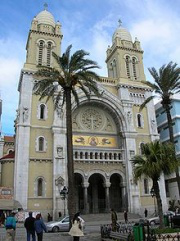Tunisian archbishop: 'uprising shows desperation of people'

St Vincent de Paul Cathedral, Tunis
The uprising in Tunisia has sprung from a desperate need for freedom - that is the view Monsignor Maroun Elias Lahham, the Archbishop of Tunis.
In an interview with the Missionary News Service today, he said: "This is an attempt to move from an authoritarian regime to a democratic one. It is groundbreaking, because there aren't any Arab countries with democratic regimes. The Tunisian people are afraid because they are the first to start".
There were more riots in Tunis yesterday. The opposition says that the emergency government of national unity is still being dominated by the party of former president Al Zine el Abidine Ben Ali.
Bishop Lahham said: "In 80% of the streets the situation is back to normal, but it is too early to tell if the new government will be open and democratic. It seems that the executive includes some of the least corrupt people from those who used to collaborate with Ben Ali. The problem is that during 23 years of regime, no new leader has been able to emerge. Things will change only after the elections".
The revolt started with protests against high costs of living and unemployment, in which a young student died after setting himself on fire.
The Bishop said initially the protests had been about the dire economic situation in Tunisia, but soon they moved to an outright rejection of the political system there which has been stagnant for many years.
"Tunisians have been pushed by the need for freedom" he said, adding that it was too early to say what is going to happen next.
"We pray for a peaceful transition" he said.
Islam is by far the dominant religion in Tunisia; 99% of Tunisians are Muslim. The Christian community, composed of foreign residents and a small group of native-born citizens of European or Arab descent, numbers about 25,000 and is dispersed throughout the country.
There are also about 2,000 Protestants in Tunisia.
The Roman Catholic Church in Tunisia, which forms the Archdiocese of Tunis, has 12 churches, nine schools, several libraries, and two clinics. In addition to holding religious services, the Catholic Church opened a monastery, freely organized cultural activities, and performed charitable work throughout the country.
The country has a rich Christian heritage. An exhibition in 2005 marked the 1,650th anniversary of St Augustine's birth there. Carthage was then the Christian metropolis of Africa, the second see after Rome, with numerous dioceses, saints, pastors and theologians. The writings of Tertullian; St Cyprian, bishop of Carthage, martyred in 258; and St Augustine had a major influence on the faith and life of the universal Church.
Source: MISNA/BBC
















